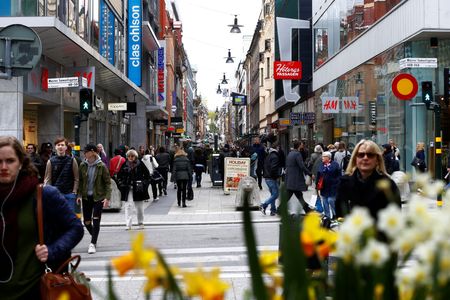 1
1 1
1
STOCKHOLM (Reuters) – Inflation in Sweden slowed faster than expected in April, data from the statistics office showed on Monday, good news for the central bank that has fretted that price pressure could prove sticky and force it to make monetary policy tighter for longer.
Consumer prices in Sweden, measured with a fixed interest rate, rose 0.2% in April from the previous month and were up a 7.6% from the same month last year, the statistics office (SCB) said in a statement.
The central bank targets 2% CPIF inflation. Stripping out volatile energy prices – a measure the central bank is looking closely at – underlying inflation was 8.4% on the year.
For headline inflation, analysts had forecast 7.9%, the same as the Riksbank. Underlying inflation was seen by analysts at 8.7% and at 8.6% by the Riksbank.
Central banks have pushed up rates at a record pace over the last year. Economic growth is slowing and the strain of higher rates has revealed fault lines in the financial system.
Inflation seems to have peaked, but it remains much too high. Rate-setters are worried that if it does not fall quickly, it will prove even harder to control price pressures in the longer term, presenting them with a nasty choice – increase the pain for households or let their grasp on prices slip.
At the end of April, the Riksbank raised rates by a half-percentage-point to 3.50%. Another quarter-point hike is expected in June or September, before the tightening cycle comes to an end.
Policy-makers said they were ready to rethink the plan if price pressures did not fall back as expected.
April’s dip in inflation will give the Riksbank some breathing space and, if supported by another reassuring outcome in May, could even be enough for them to draw a line under the past year’s long string of rate increases.
“We think that the Riksbank is going to hold the policy rate around the current level for the rest of the year and next year,” Lars Kristian Feste, head of fixed income at Ohman Fonder, said.
Markets see another increase but then interest rates starting to fall around mid-2024.
The crown was slightly weaker against the euro after the data.
May inflation data is due on June 14. The Riksbank will announce its next policy decision on June 29.
(Reporting by Simon Johnson; editing by Niklas Pollard, Robert Birsel)